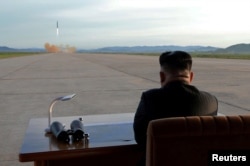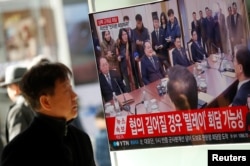The White House says the ultimate goal of any negotiations between President Donald Trump and North Korean leader Kim Jong Un is denuclearization, adding the United States' “maximum pressure” campaign on Pyongyang will continue and sanctions on the isolated country will not be lifted until concrete actions are taken towards complete and total denuclearization.
“We’re not going to take the North Koreans simply at their word,” White House Press Secretary Sarah Huckabee Sanders said Monday in response to a question from VOA News about recent declarations by Pyongyang.
“We’re not naïve in this process,” added Huckabee Sanders. “We’ve seen some steps in the right direction, but we have a long way to go.”
Kim has announced a freeze of nuclear weapons tests and intercontinental ballistic missile launches.
Trump on Sunday appeared to infer that the North Korean leader had already agreed to give up his nuclear arsenal, despite such no such announcement from Pyongyang.
The president said on Twitter, "We haven’t given up anything & they have agreed to denuclearization (so great for World), site closure, & no more testing!"
Huckabee Sanders on Monday noted China’s more active role in pressuring Pyongyang, which she attributed to the positive working relationship between U.S. President Donald Trump and Chinese President Xi Jinping.
“China has taken a more active role on putting pressure on North Korea. They can certainly do more and we hope they will,” she added.
Asked earlier in the day how the president defined denuclearization, the press secretary responded, “it means that North Korea doesn’t have or isn’t testing nuclear missiles.”
Asked a similar question during Monday’s White House briefing, Huckabee Sanders demurred, saying “I’m not going to negotiate with you guys.”
Others in the administration are expressing hope for positive results from the anticipated Trump-Kim summit.
“Right now, I think there’s a lot of reasons for optimism, that the negotiations will be fruitful, and we’ll see,” U.S. Defense Secretary Jim Mattis told reporters at the Pentagon.
Although South Korea has said the North has expressed interest in doing away with its nuclear weapons, Kim, however, in Saturday’s testing freeze statement, indicated North Korea’s nuclear arsenal would remain intact, calling it a “powerful treasured sword” that would firmly guarantee “our descendants can enjoy the most dignified and happiest life in the world".
Nuclear and missile proliferation scholar Joshua Pollack of the Monterey Institute of International Studies says: “I’m not at all convinced Kim Jong Un has any interest in discussing his nuclear arsenal with anyone else. He's made his move and we can take it or leave it.”
Sung-Yoon Lee, assistant professor in Korean Studies at Tufts University, said it is only a matter of time before Kim demands the complete withdrawal of U.S. troops from South Korea.
"But for now, Kim is creating the illusion of coming across as a reasonable guy who is willing to make some major concessions when in fact no concession has been made at all," he said.
Before the planned summit with Trump, for which no location or date has been determined, Kim is set to meet Friday with South Korean President Moon Jae-in at a Korean border village.
South Korean on Monday stopped its broadcasts of propaganda messages and pop music across the border. South Korea's defense ministry said in a statement it hopes the move will help contribute to creating peace between the two countries.
Neither South Korea nor the United States has diplomatic relations with North Korea.
A state of war technically persists on the peninsula. Active combat in the 37-month long Korean War ended with an armistice in 1953. South Korea was not a signatory.
Moon’s government says Seoul hopes to resolve the 65-year impasse.
“The signing of a peace treaty must be pursued after an end to the war is declared,” Moon, last Thursday, told media representatives at the presidential Blue House.
Pollack, who is also editor of the "The Nonproliferation Review," tells VOA that if Washington’s position remains that there cannot be sanctions relief “without complete, verifiable, irreversible dismantlement of North Korea's nuclear program,” then the South Koreans will be left with a stark choice: “Either break from the U.S. or leave both of these issues alone. They can focus instead on a peace treaty."







